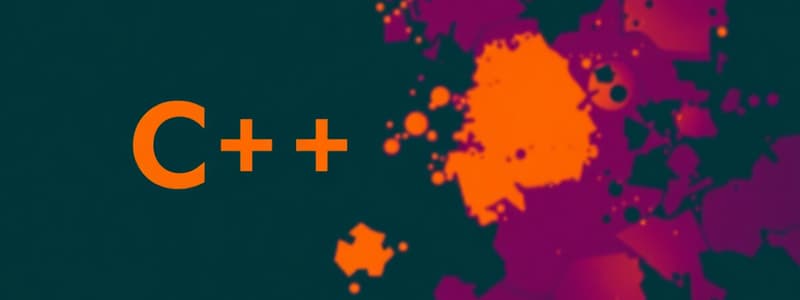Podcast
Questions and Answers
What is the purpose of declaration statements in a C++ program?
What is the purpose of declaration statements in a C++ program?
- To declare variables and constants (correct)
- To manage memory allocation
- To accept input from the user
- To perform calculations and create output
Which of the following statements about preprocessor directives is correct?
Which of the following statements about preprocessor directives is correct?
- They are executed at runtime
- They must end with a semicolon
- They begin with a '#' symbol (correct)
- They are part of the executable code
Which of the following correctly describes the components of a C++ program?
Which of the following correctly describes the components of a C++ program?
- Is limited to declaration statements only
- Includes both preprocessor directives and program statements (correct)
- Consists of only executable statements
- Only contains preprocessor directives
What type of code does a C++ compiler generate after processing a source code file?
What type of code does a C++ compiler generate after processing a source code file?
Which statement is true regarding the delimiters in C++?
Which statement is true regarding the delimiters in C++?
Which statement best describes a programming language?
Which statement best describes a programming language?
What is the purpose of syntax in programming?
What is the purpose of syntax in programming?
In C++, which of the following represents a semantic error?
In C++, which of the following represents a semantic error?
Which statement is true regarding preprocessor directives in C++?
Which statement is true regarding preprocessor directives in C++?
What does the term 'function' refer to in programming?
What does the term 'function' refer to in programming?
Flashcards
C++ Programming
C++ Programming
A set of rules, symbols and special words used to create computer programs.
Computer Program
Computer Program
A sequence of statements designed to accomplish a specific task.
Function (subprogram)
Function (subprogram)
A collection of statements that performs a specific task when executed.
Syntax
Syntax
Signup and view all the flashcards
Compilation Errors
Compilation Errors
Signup and view all the flashcards
C++ Statements
C++ Statements
Signup and view all the flashcards
Declaration Statements
Declaration Statements
Signup and view all the flashcards
Executable Statements
Executable Statements
Signup and view all the flashcards
Preprocessor Directives
Preprocessor Directives
Signup and view all the flashcards
C++ Program Parts
C++ Program Parts
Signup and view all the flashcards
Study Notes
C++ Programming Fundamentals
- C++ programs utilize functions, one of which is
main - Identifiers are composed of letters, digits, and underscores
- Arithmetic operators include: +, -, *, /, % (modulus)
- Arithmetic expressions follow specific precedence rules
- Variables are memory locations whose contents can change
- Constants hold fixed values and cannot be changed
- Function prototypes provide function signature without body, placed before main
- Value-returning functions return specific values via
returnstatements - Void functions do not use a
returnstatement - Formal parameters are in the function definition, matched with actual parameter in the function call
- Local variables are declared within a function or block of code
- Global identifiers are declared outside of any function
- Static variables maintain their value between function calls
- Arrays hold multiple values of the same data type, accessed by index
- C-strings are null-terminated character arrays
Data Types
- Integral types:
int,char,short,long,bool - Floating-point types:
float,double - Strings:
string(often used with libraries) and character arrays (C-strings) - Enumeration types: user-defined integral types
Operators
- Arithmetic operators: +, -, *, /, % (modulus)
- Assignment operator: =
- Increment/decrement operators: ++, -- (pre- and post-)
- Comparison operators: ==, !=, >, <, >=, <=
- Logical operators: && (and), || (or), ! (not)
- Conditional operator: ?: (ternary operator)
Input/Output
cinfor reading input from the consolecoutfor displaying output to the console- Manipulators (e.g.,
endl) to format output - Input/Output Streams: manage input and output
Arrays
- Array initialization during declaration
- Accessing array elements by index
- Restrictions on array processing
- Multidimensional arrays: arrays of arrays
- Parallel arrays store related data in corresponding elements
- Passing arrays to functions (passed by reference)
- Using
constwith arrays in function parameters
C-Strings (Character Arrays)
- Null-terminated character arrays
- String comparison using
strcmpfunction - String input/output using
cin,cout, and file streams - String manipulation functions including
strcpy,strcmp,strlen.
Functions
- Function overloading: multiple functions with the same name (different parameters)
- Function prototypes are used to declare function types ahead of function definition
- Functions are crucial for modularity
- Functions must have a return type, or be
void.
Scope
- Local and global identifiers have different scopes
- Local identifiers exist only inside the function where declared.
- Global identifiers are accessible everywhere in program, except in local scope where a local identifier has the same name.
- Scope resolutions deal with conflicting identifiers
Other Concepts
- Type casting explicitly convert between data types (e.g.
static_cast) - Debugging practices, use of drivers and stubs (for testing individual functions or blocks).
Studying That Suits You
Use AI to generate personalized quizzes and flashcards to suit your learning preferences.




